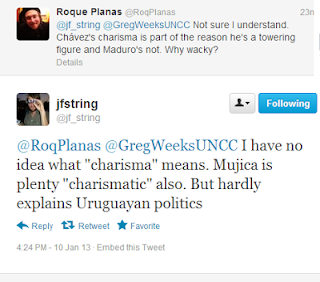Charisma in Latin America
I had an interesting Twitter discussion with J.F. String (@jf_string) and Roque Planas (@RoqPlanas) with others joining in. It centered on the punditry about Venezuela, and excessive use of "charisma" as an explanatory variable.
The question about "charisma" is interesting. Hugo Chávez is clearly charismatic, but in and of itself that doesn't tell us anything. How do we measure charisma? It gets tossed around all the time to explain half of what Chávez does, and what his successors can't do (and I am plenty guilty of this). The same was true with countless debates about Fidel and Raúl Castro.
From a social science perspective, however, this gets tricky. There are lots of current Latin American presidents who could be deemed charismatic, but how do we measure that? Is Chávez a 10 on a scale of 10, while Rafael Correa is a 7? How do we determine that, and what does it tell us about what they can or cannot accomplish politically?
The prevailing hypothesis is that the more charisma you have, the more unified you can keep your political movement. Fair enough, but it actually tell us almost nothing even if we can define the term. Charisma is not the only factor involved, so we don't know how much charisma itself matters. Further, it tells us nothing about degree. How much more unified do you become with x charisma?
So, I have lots of questions but not so many answers. It is fine to argue that Hugo Chavez is more charismatic than Nicolas Maduro, and therefore Maduro will have a more difficult time holding the diverse coalition together, as long as we recognize that this is imprecise and tells us very little about specific political outcomes.


7 comments:
Charisma can be difficult to explain sometimes. It's like falling in love with someone, you can't quiet explain why, but you do feel the vibe. Politically you can be smart as hell, but if you don't have charisma its useless.
Strikes me that we can think of this just as we think of power: rather than being a substance that individuals possess to greater or lesser degree, charisma is an index of the differential effectiveness of actors. We would then measure charisma in terms of the political effectiveness of an actor, when that political effectiveness is otherwise impossible to account for by, for instance, control of economic resources. Still has to be operationalized, of course...
One of the problems in political science is that, when people can't find a way of measuring something that might be important, they then have a tendency to mistakenly think that they can treat it as if it's not a variable. This can lead to major omitted variable bias.
This is very much the case with respect to how to understand Venezuelan politics and Chavez's relationship with the hard core of his base. I wouldn't get hung up on the word charisma, per se, as there are different kinds of charisma, and some groups in Venezuela obviously don't find Chavez as charismatic as others. The key is really how Chavez personally connects with his base. Chavez will sometimes shift into a kind of delivery that is a bit like that of Muhammed Ali. When he moves into mesmeric mode, his eyes open wide, and he pauses for emphasis after certain words in a way that is a bit pedantic but also very powerful. It's not necessarily that he's the greatest speaker, per se. It's that he mesmerizes his base with the feeling and seeming sincerity of what he says in the way that he says it. And, of course, when you combine this with the fact that his government has devoted a significant amount of resources to the base, that he's pictured all over the place in affectionate embraces with poor people, and that he has a pretty good sense of humor to boot, what we're basically talking about here is a populist dynamo (for good or bad).
In other words, there's a reason you can't just call a new election when this guy is lying in a hospital bed and hasn't given up yet. The hard core of his base would be up in arms, and that's really not a recipe for the kind of transition that any serious institutionalist would want to see.
And, frankly, those sectors of the opposition that are chomping at the bit for elections are really self-defeating, as all that will do is add to the Chavistas' sympathy vote. If I were Capriles, I would want to keep my dogs on a leash right about now, as there's nothing he has to gain from not doing so.
The overall point is about punditry. We can find a way to operationalize it, but it'll still be tossed around loosely to explain explain all kinds of things.
Fair enough, but it could also be true that a pundit will occasionally hit on an important conceptual insight that a social scientist will overlook because the social scientist hasn't found a way to measure the concept and thus dismisses its relevance.
This comes up a lot in my conversations about Evo Morales. The Western media invariably describes him as charismatic, when in fact he is one of the least charismatic speakers I have ever listened to. Vice President Garcia Linera is actually far more charismatic. Evo's appeal lies elsewhere, but it is too complex for the media to understand or explain.
I think charisma is is a quality that most presidents have, but more so in latin america because the culture itself is more charismatic, the more charismatic a politician is the more votes it will get him. once he gets his votes charisma becomes a thing of the past.
Post a Comment